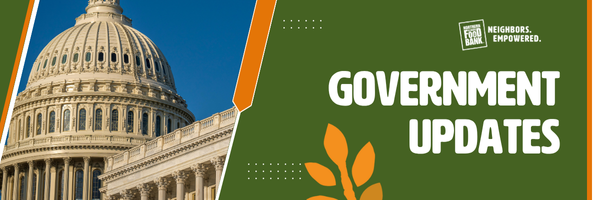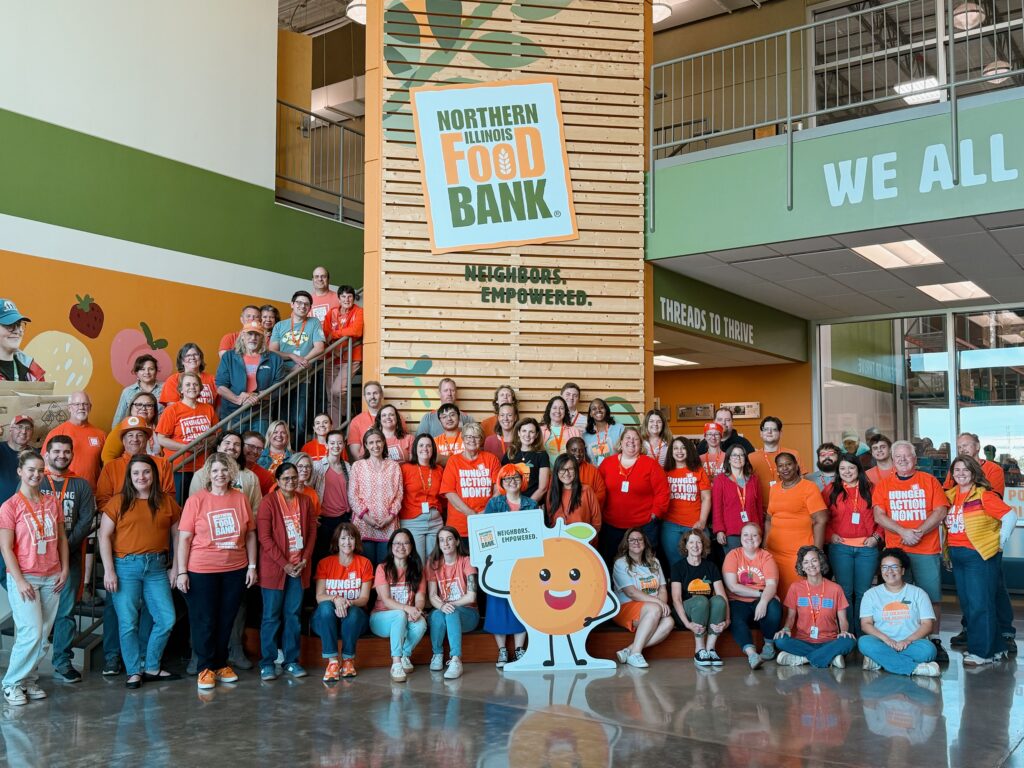Use Your Voice

Know Your Elected Officials
Research your elected officials and see what they are doing to solve hunger. Not sure who your current elected officials are? Find out now.

Register to Vote
You have the power to elect legislators who are dedicated to eliminating hunger in your community. Make sure you register so your voice can be heard.

Share Your Story
Have you been impacted by hunger, volunteered at a food bank or pantry, advocated for hunger-relief, or noticed the effects of hunger on friends, family, or neighbors? We want to hear from YOU!
Northern Illinois Food Bank Advocacy Agenda

Update on SNAP Benefits During the Government Shutdown
November 1, 2025
Federal officials have frozen funding for the Supplemental Nutrition Assistance Program (SNAP) benefits nationwide until the government shutdown is resolved. We understand this news may create uncertainty and stress for you and your family, but please know that we are here for you.
At Northern Illinois Food Bank, we value every person and are committed to making sure all our neighbors, no matter their circumstances, can access fresh, nutritious food quickly and safely.
We are working hard to fill the gap by securing additional food donations and expanding food distributions across our 13-county service area.
If you need food, we’re here to help. Visit the “Get Groceries” page to find resources, pantry locations, and updates. Stay informed and check back frequently for the latest information.
Northern Illinois Food Bank statement on Government Shutdown 2025
Attribute to Julie Yurko, President and CEO, Northern Illinois Food Bank
Oct. 1, 2025
When the federal government shuts down, uncertainty begins immediately. Families, federal workers, including active-duty military, those employed by federal contractors, and seniors suddenly face impossible choices as they do not know if paychecks or food benefits will arrive on time.
Many Americans are just a single missed paycheck away from needing support from their local food banks. A prolonged shutdown will deepen this strain, leading to increased demand for assistance at a time when food banks are already stretched due to sustained high need.
The Northern Illinois Food Bank network, comprising over 900 agencies and program sites, remains committed to opening our doors for people across Northern Illinois. However, ensuring that no one goes hungry will require a united effort from all of us, lawmakers, businesses, faith and community organizations, and individuals.
We urge Congress to end the shutdown. Prolonged shutdowns create instability in people’s lives with every passing day, forcing many to make impossible choices between putting food on the table and paying their bills.
Impact on Nutrition Programs:
- SNAP: USDA has confirmed that October benefits will be available in full on their normal schedule. If the shutdown continues into November, there could be delays or reduced benefits.
- WIC: Benefits and services will continue as long as possible, but disruptions could occur in October.
- Child Nutrition Programs: School breakfast, lunch, and after-school meals will continue without interruption through the Child and Adult Care Food Program (CACFP).
- TEFAP: Food orders already purchased and confirmed should be delivered as expected. Unconfirmed orders could face delays.
We are closely monitoring these programs and will continue to advocate for uninterrupted support. If you or someone you know might be impacted by the shutdown, you can find food assistance here: Get Groceries & Resources – Northern Illinois Food Bank.
Now more than ever, we need to stand united to ensure that our neighbors have access to the food they need to thrive.
Statement: Northern Illinois Food Bank responds to Senate approval of bill cutting SNAP
July 3, 2025
Today, Congress passed the “Big Beautiful Bill Act,” which includes nearly $200 billion in cuts to the Supplemental Nutrition Assistance Program (SNAP). These cuts implemented through increased work requirements, cost-shifting to states, and limits on benefit adjustments, will significantly reduce access to food assistance and increase demand on charitable food systems already stretched thin. For Illinois alone, the cost burden could exceed $1.2 billion annually.
Northern Illinois Food Bank is disappointed by this development. History shows that when SNAP benefits are reduced, demand at our Food Bank can soar by as many as 60,000 to 80,000 additional neighbors each month seeking food assistance. Vulnerable groups like children, seniors, veterans, and people with disabilities would be hit hardest. Around 6 billion meals will be lost nationwide each year. Compounding the issue, our Food Bank expects a 40% drop in federal food and funding, creating a $3–$4 million gap.
In response, Northern Illinois Food Bank launched a Community Response Fund to help offset lost resources and ensure we can continue to provide nutritious food to neighbors in need. While we work to meet immediate needs, we remain focused on long-term advocacy to address the root causes of hunger and ensure all Northern Illinois neighbors have access to the food they need to thrive.
Questions? Check here for answers to questions we are frequently asked.

Why Advocacy Matters
Food insecurity is a complex and multi-faceted issue that requires a multipronged approach. While Northern Illinois Food Bank works to meet the immediate symptom of food insecurity – hunger – through our network of food pantries, soup kitchens and meal sites, we also collaborate with national, state and local partners to address the root causes of food insecurity, lift our neighbors up, and build healthy communities that thrive. An important aspect of this work is advocating for policies that can decrease the existence of food insecurity and strengthen our communities.
Along with the non-profit, charitable food assistance network – of which the Food Bank is a part of – federal and state nutrition programs are an integral part of solving hunger. Due to these multiple approaches and programs working in concert with each other, Northern Illinois Food Bank plays an important role in educating the public and our elected officials on the realities facing the neighbors we serve.
By participating in key legislation discussions and advocating for food security policies, we are able to give a voice to not only our organization, but to our agencies and, ultimately, our neighbors. What we say and do can be the difference between having a meal on the table or not for families in Northern Illinois.
Our Advocacy Mission
In order to solve hunger in our service area, Northern Illinois Food Bank works with national, state and local partners to advocate for administrative and legislative policies that strengthen our communities and decrease instances of food insecurity.
Our Advocacy Team
Northern Illinois Food Bank’s internal Advocacy Team is comprised of experts in the areas of SNAP, TEFAP, Child Nutrition and Seniors. Our team meets monthly to discuss current policy issues and formulate strategies to engage with our elected officials. This team is led by the Food Bank’s full-time Communications and Advocacy Specialist.
Learn More About Programs/Policies that are Relevant to the Food Bank and Our Neighbors
TEFAP
The Emergency Food Assistance Program (TEFAP) is vital for our continued operations at the Northern Illinois Food Bank. Under this program, the USDA purchases fruits, vegetables, and other staples from U.S. growers and producers and distributes these products to food banks across the country. Without this critical source of food, the Northern Illinois Food Bank would be without much needed resources for its neighbors. The upcoming Farm Bill is a crucial piece of legislation that can help strengthen programs like TEFAP and SNAP and we are calling on Congress to increase the amount of entitlement funding for TEFAP commodities as well as increase storage and distribution funds to help us better offset the costs of transporting TEFAP food. To learn more about TEFAP and its importance to food banks, please follow this link.
SNAP
The Supplemental Nutrition Assistance Program (SNAP) is the most effective anti-hunger program in the United States and helps over 40 million people secure food. Through this program, individuals using SNAP receive monthly funds through a benefits card, similar to a debit card, to buy groceries at local stores or farmers’ markets. The amount individuals receive each month depends on income and family size. Currently, 2/3 people who receive SNAP are kids, seniors or people living with disabilities. The Farm Bill is a critical opportunity to strengthen SNAP and we are calling on Congress to increase SNAP’s purchasing power by basing benefits on the Low-Cost Food Plan rather than the current Thrifty Food Plan and also remove enrollment barriers for adults, immigrants and college students. To learn more about SNAP and its importance, please visit this link.
Military Hunger
Nearly a quarter (24%) of active duty service members are food insecure. However, many US service members cannot access SNAP due to their Basic Allowance for Housing (BAH) counting as income in SNAP calculations. We are urging Congress to support the bipartisan legislation from Sens. Tammy Duckworth, D-Ill., and Lisa Murkowski, R-Alaska, that will help more service members access SNAP benefits by excluding the BAH from the gross income calculation for SNAP eligibility. To learn more about military hunger, please visit this link.
Child Nutrition Reauthorization
Child Nutrition Reauthorization (CNR) is the process that Congress uses to update child nutrition programs like summer and afterschool meals, school breakfast and lunch, and the Special Supplemental Nutrition Program for Women, Infants, and Children (WIC). The Child Nutrition programs continue to operate with or without reauthorization. Although this process typically happens every five years, Congress has yet to make significant updates since 2010. Without CNR, child nutrition programs generally can’t significantly expand or improve. To learn more about CNR, please visit this link.
Questions?
For any additional questions, please contact, Robert Desio via email at [email protected].